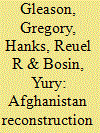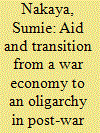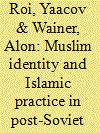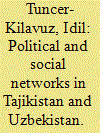|
|
|
Sort Order |
|
|
|
Items / Page
|
|
|
|
|
|
|
| Srl | Item |
| 1 |
ID:
103133


|
|
|
|
|
| Publication |
2009.
|
| Summary/Abstract |
The reconstruction of Afghanistan is in part dependent upon the reintegration of Afghanistan into the international community. Reintegration, in turn, is dependent upon Afghanistan's trans-border infrastructure of communication, trade, transport, water, power and investment. Accordingly, increased regional economic cooperation is a key element of Afghanistan's reconstruction. This article analyses regional economic cooperation in the South and Central Asian region in terms of logic, institutions, actors, and expectations. The article argues in favour of inclusiveness to enlarge the number of beneficiaries of economic benefits of regional economic cooperation while avoiding the pitfalls of risky strategies of faulty collective action.
|
|
|
|
|
|
|
|
|
|
|
|
|
|
|
|
| 2 |
ID:
103132


|
|
|
|
|
| Publication |
2009.
|
| Summary/Abstract |
Exclusion and violence persist in post-conflict states, despite international assistance aimed at the demilitarization of politics. Through a field-based study of Tajikistan, this paper argues that aid focuses on economic liberalization, not the implementation of peace agreements, in the initial stage of post-war transition. Such an organization of aid empowers a particular group of elites who have privileged access to state assets at the time of civil war settlement, allowing them to establish institutional frameworks that will consolidate their personal and monopolistic control of resources. This leads to the collapse of power-sharing arrangements, as the incumbent regime seeks to remove wartime commanders and opposition leaders from the administrative apparatus. In Tajikistan, the incumbent regime has also prosecuted many of these former allies and opponents on account of corruption through state agencies established with donor assistance. Aid thus institutionalized exclusion and sustains patterns of violence along civil war divisions, rather than transforming wartime power structures.
|
|
|
|
|
|
|
|
|
|
|
|
|
|
|
|
| 3 |
ID:
103135


|
|
|
|
|
| Publication |
2009.
|
| Summary/Abstract |
This article explores the participation of university students in non-governmental organizations (NGOs) and other forms of association in the city of Osh, Kyrgyzstan. While the literature tends to criticize donor interventions in the post-Soviet space, an analysis of donor-funded youth projects calls for a more differentiated evaluation. It is argued that youth-oriented associations appeal to the students of Osh because these associations have created much needed 'youth spaces'. In some cases, however, the appeal has little to do with the missions of the projects. Whatever the blueprints prepared by foreign donors, youth-oriented clubs and NGOs provide young people with opportunities for entrepreneurship, for leisure pursuits and for experimenting with their dreams and fantasies. Offering a case study of a group of students who have joined a donor-funded NGO, Students in Free Enterprise (SIFE), the article then charts the students' appropriation of this NGO.
|
|
|
|
|
|
|
|
|
|
|
|
|
|
|
|
| 4 |
ID:
103136


|
|
|
|
|
| Publication |
2009.
|
| Summary/Abstract |
After the dissolution of the Soviet Union, the newly independent countries of Central Asia had the opportunity to endorse religious freedom. Nevertheless, they chose for the most part to continue the policy of monitoring religious activity, on the pretext of protecting their countries from radical Islam. This study focuses on Islamic praxis in post-Soviet Central Asia. Based on a survey conducted in four Central Asian successor states (excluding Turkmenistan), it examines everyday Islam - observance of precepts, life-cycle rites, prayer and mosque attendance - as well as people's perceptions about the role of Islam in their lives and in the evolution of their societies and the place of Islam in local identity. The authors' findings have not always corresponded to usually accepted hypotheses and they have sought to analyse the reasons for this. Undoubtedly, the exigencies of the current political situation both act as a restraint on respondents in addressing the questions put to them and restrict their religious praxis outside the home. It is difficult to assess how far responses would have differed had the survey been conducted under more favourable circumstances; indeed, some of the questions may have been genuinely misinterpreted as a result of differences in outlook and the use of concepts.
|
|
|
|
|
|
|
|
|
|
|
|
|
|
|
|
| 5 |
ID:
103137


|
|
|
|
|
| Publication |
2009.
|
| Summary/Abstract |
A major debate among scholars studying Central Asian societies concerns the structure of social and political networks in the region. Still unresolved is the issue of whether to define such networks in terms of 'clans', 'regionalism', or personal networks. This article, based on data collected during fieldwork in Tajikistan and Uzbekistan, attempts to understand these social and political networks. It suggests that networks are very complex. The networks in Tajikistan and Uzbekistan draw on various loyalties including ties of family, friendship, work, education, and patron-client relationships. They are neither purely regional nor purely clan-based. Personal networks, factions, and self-interest play important roles. At the elite level, networks more closely resemble patron-client networks, which may or may not include regional or kinship ties. Among ordinary people, such ties tend to be based on localism, kinship, and/or patronage relationships.
|
|
|
|
|
|
|
|
|
|
|
|
|
|
|
|
|
|
|
|
|